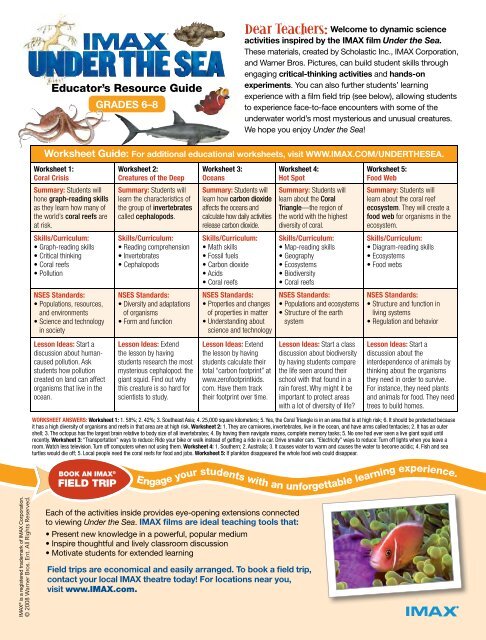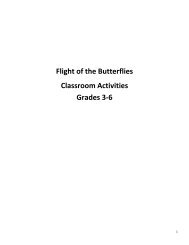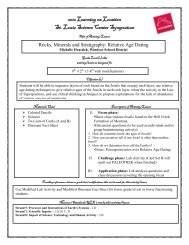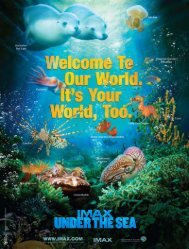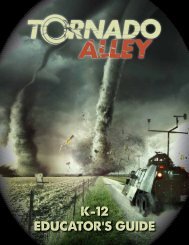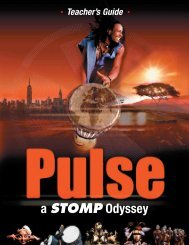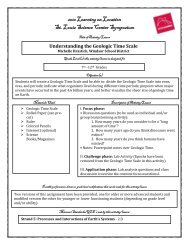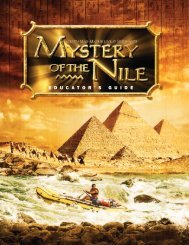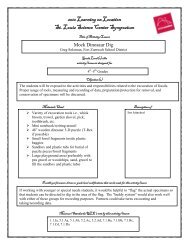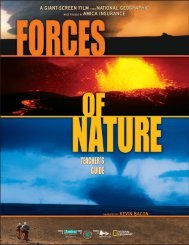You also want an ePaper? Increase the reach of your titles
YUMPU automatically turns print PDFs into web optimized ePapers that Google loves.
Educator’s Resource Guide<br />
GRADES 6<strong>–</strong>8<br />
Dear Teachers: Welcome to dynamic science<br />
activities inspired by the IMAX film Under the Sea.<br />
These materials, created by Scholastic Inc., IMAX Corporation,<br />
and Warner Bros. Pictures, can build student skills through<br />
engaging critical-thinking activities and hands-on<br />
experiments. You can also further students’ learning<br />
experience with a film field trip (see below), allowing students<br />
to experience face-to-face encounters with some of the<br />
underwater world’s most mysterious and unusual creatures.<br />
We hope you enjoy Under the Sea!<br />
Worksheet Guide: For additional educational worksheets, visit WWW.IMAX.COM/UNDERTHESEA.<br />
Worksheet 1:<br />
Coral Crisis<br />
Summary: Students will<br />
hone graph-reading skills<br />
as they learn how many of<br />
the world’s coral reefs are<br />
at risk.<br />
Skills/Curriculum:<br />
• Graph-reading skills<br />
• Critical thinking<br />
• Coral reefs<br />
• Pollution<br />
Worksheet 2:<br />
Creatures of the Deep<br />
Summary: Students will<br />
learn the characteristics of<br />
the group of invertebrates<br />
called cephalopods.<br />
Worksheet 3:<br />
Oceans<br />
Summary: Students will<br />
learn how carbon dioxide<br />
affects the oceans and<br />
calculate how daily activities<br />
release carbon dioxide.<br />
Skills/Curriculum:<br />
• Math skills<br />
• Fossil fuels<br />
• Carbon dioxide<br />
• Acids<br />
• Coral reefs<br />
NSES Standards:<br />
• Properties and changes<br />
of properties in matter<br />
• Understanding about<br />
science and technology<br />
Worksheet 4:<br />
Hot Spot<br />
Worksheet 5:<br />
Food Web<br />
Summary: Students will<br />
learn about the coral reef<br />
ecosystem. They will create a<br />
food web for organisms in the<br />
ecosystem.<br />
Skills/Curriculum:<br />
• Diagram-reading skills<br />
• Ecosystems<br />
• Food webs<br />
Summary: Students will<br />
learn about the Coral<br />
Triangle—the region of<br />
the world with the highest<br />
diversity of coral.<br />
Skills/Curriculum:<br />
• Reading comprehension<br />
• Invertebrates<br />
• Cephalopods<br />
Skills/Curriculum:<br />
• Map-reading skills<br />
• Geography<br />
• Ecosystems<br />
• Biodiversity<br />
• Coral reefs<br />
NSES Standards:<br />
• Populations, resources,<br />
and environments<br />
• Science and technology<br />
in society<br />
NSES Standards:<br />
• Diversity and adaptations<br />
of organisms<br />
• Form and function<br />
NSES Standards:<br />
• Populations and ecosystems<br />
• Structure of the earth<br />
system<br />
NSES Standards:<br />
• Structure and function in<br />
living systems<br />
• Regulation and behavior<br />
Lesson Ideas: Start a<br />
discussion about humancaused<br />
pollution. Ask<br />
students how pollution<br />
created on land can affect<br />
organisms that live in the<br />
ocean.<br />
Lesson Ideas: Extend<br />
the lesson by having<br />
students research the most<br />
mysterious cephalopod: the<br />
giant squid. Find out why<br />
this creature is so hard for<br />
scientists to study.<br />
Lesson Ideas: Extend<br />
the lesson by having<br />
students calculate their<br />
total “carbon footprint” at<br />
www.zerofootprintkids.<br />
com. Have them track<br />
their footprint over time.<br />
Lesson Ideas: Start a class<br />
discussion about biodiversity<br />
by having students compare<br />
the life seen around their<br />
school with that found in a<br />
rain forest. Why might it be<br />
important to protect areas<br />
with a lot of diversity of life?<br />
Lesson Ideas: Start a<br />
discussion about the<br />
interdependence of animals by<br />
thinking about the organisms<br />
they need in order to survive.<br />
For instance, they need plants<br />
and animals for food. They need<br />
trees to build homes.<br />
WORKSHEET ANSWERS: Worksheet 1: 1. 58%; 2. 42%; 3. Southeast Asia; 4. 25,000 square kilometers; 5. Yes, the Coral Triangle is in an area that is at high risk; 6. It should be protected because<br />
it has a high diversity of organisms and reefs in that area are at high risk. Worksheet 2: 1. They are carnivores, invertebrates, live in the ocean, and have arms called tentacles; 2. It has an outer<br />
shell; 3. The octopus has the largest brain relative to body size of all invertebrates; 4. By having them navigate mazes, complete memory tasks; 5. No one had ever seen a live giant squid until<br />
recently. Worksheet 3: “Transportation” ways to reduce: Ride your bike or walk instead of getting a ride in a car. Drive smaller cars. “Electricity” ways to reduce: Turn off lights when you leave a<br />
room. Watch less television. Turn off computers when not using them. Worksheet 4: 1. Southern; 2. Australia; 3. It causes water to warm and causes the water to become acidic; 4. Fish and sea<br />
turtles would die off; 5. Local people need the coral reefs for food and jobs. Worksheet 5: If plankton disappeared the whole food web could disappear.<br />
BOOK AN IMAX ®<br />
FIELD TRIP<br />
Engage your students with an unforgettable learning experience.<br />
IMAX ® is a registered trademark of IMAX Corporation.<br />
© 2008 Warner Bros. Ent. All Rights Reserved.<br />
Each of the activities inside provides eye-opening extensions connected<br />
to viewing Under the Sea. IMAX films are ideal teaching tools that:<br />
• Present new knowledge in a powerful, popular medium<br />
• Inspire thoughtful and lively classroom discussion<br />
• Motivate students for extended learning<br />
Field trips are economical and easily arranged. To book a field trip,<br />
contact your local IMAX theatre today! For locations near you,<br />
visit www.IMAX.com.


